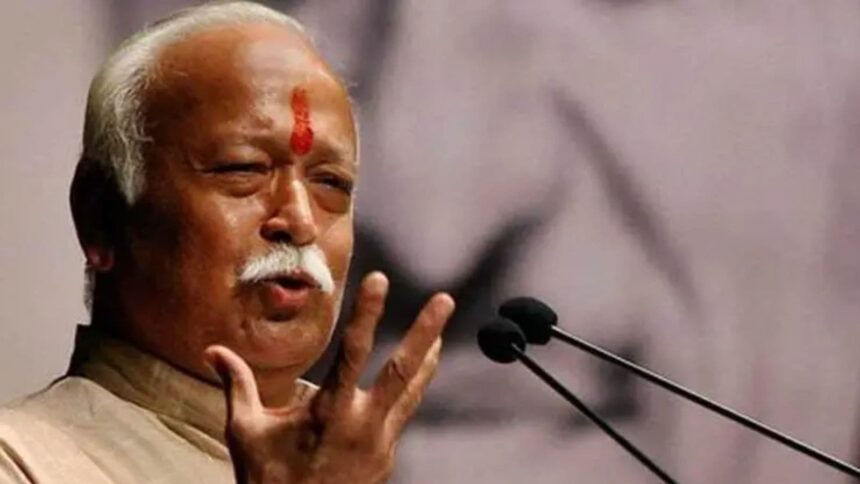Rashtriya Swayamsevak Sangh (RSS) chief Mohan Bhagwat said Saturday that the world listens to one’s words on peace and non-violence only if one has power.
Speaking at Jaipur’s Ravinath Ashram on the occasion of Sant Ravinath Maharaj’s death anniversary, Bhagwat said Bharat was the world’s “oldest nation” and therefore the “older brother”, while indicating that there is love for all, “even Pakistan”. He then drew a parallel between India and Pakistan and Lord Ram and the demon king Ravan, stating that Ram did “a great service” to Ravan by killing him.
Bhagwat’s statement comes days after India and Pakistan announced a ceasefire following tensions on the border in the aftermath of India’s strikes in Pakistan-occupied Kashmir and Pakistan in retaliation to the Pahalgam terror attack in which 26 people were killed.
At the event, Bhagwat said “Our ancestors have handed down the responsibility to us to live a life in a way where people from the rest of the world look at us and learn how to lead their own lives. We should therefore lead a life of sacrifice and not indulgence, of selflessness and not selfishness, of harmony and not discrimination, a life which is tejasvi (majestic), and shakti sampann (full of power), as opposed to weakness.”
The weak can’t do anything, he said.
“All the truths need power … the world values all this when it sees power. The world has a nature; it’ll change when it’ll change. The world doesn’t go by words, but by the strength behind words. We have to talk about love, peace, non-violence, truth, and so on,” he said, adding that “until the world sees that it’s not just talk, but that they have the power to get this done too, they won’t listen.”
He further said: “We are the oldest nation and hence the world’s elder brother. Toh bade bhai hain isliye rob nahi kasna hai kisi par (But if we are the elder brother, it doesn’t mean we have to show off)”.
The Indian society, he said, carries on while considering everyone its own, listing the examples of India helping Sri Lanka, Nepal, Maldives in their time of crisis, “while the rest of the world fulfills their selfish interests by befriending them”.
“Bharat ki dosti mein Bharat ko jhelna bahut padta hai, in logon se apna swarth poora nahi hota (India has to suffer a lot in its friendships, these people don’t fulfill our interests). Sometimes, they even work against us. Even then, we help them, we help the world. Why do we do it? Because we have been witnessing people with such nirpeksh atmiyata (absolute affinity) here and will continue to see them,” he said.
He further said: “We have priti (love) towards all. But what do we have towards Pakistan? Uske prati bhi priti toh hai he, dvesh toh hai nahi. Dvesh hota toh unko baar baar ye nahi karna padta, hum he kar dete. (There is love for Pakistan as well, there is no hatred. If there was hatred then we wouldn’t let them do this again and again, we would have done it (once) ourselves (and ended it)). But we didn’t do it; for some reason we parted but, live happily, that’s what we thought, but they don’t think this way. What’s their solution? What our politicians have said, that’s the solution”.
Drawing a parallel with Ravan, he said that Lord Ram did a great service to Ravan by killing him, indicating that our love for all also tells us what is beneficial for whom – including bringing an end to them, like Lord Ram brought to Ravan.
“Bharat will progress in all areas and it should. Bharat kisi ki shatruta nahi karta lekin uski shatruta karne waley agar dussahas karenge toh unko poora sabak sikhane ki takat Bharat rakhega aur rakhni chahiye. (India does not have enmity with anyone, but if those who fight with it dare to do so, then India will have and should have the power to teach them a lesson),” he said.
Quoting Swami Vivekananda and citing the examples of Rome and Egypt, he said that every nation has a purpose and that it ends after fulfilling its purpose.
“Similarly, Bharat’s responsibility is to give its spirituality, religion and culture to the world,” he said.








